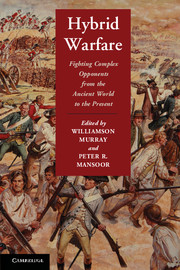Book contents
- Frontmatter
- Contents
- Figures
- Contributors
- Acknowledgment
- 1 Introduction
- 2 Conquering Germania
- 3 Keeping the Irish Down and the Spanish Out
- 4 The American Revolution
- 5 That Accursed Spanish War
- 6 The Union's Counterguerrilla War, 1861–1865
- 7 Fighting “this nation of liars to the very end”
- 8 Small Wars and Great Games
- 9 An Unexpected Encounter with Hybrid Warfare
- 10 Hybrid War in Vietnam
- 11 Conclusion
- Index
- References
1 - Introduction
Hybrid Warfare in History
Published online by Cambridge University Press: 05 August 2012
- Frontmatter
- Contents
- Figures
- Contributors
- Acknowledgment
- 1 Introduction
- 2 Conquering Germania
- 3 Keeping the Irish Down and the Spanish Out
- 4 The American Revolution
- 5 That Accursed Spanish War
- 6 The Union's Counterguerrilla War, 1861–1865
- 7 Fighting “this nation of liars to the very end”
- 8 Small Wars and Great Games
- 9 An Unexpected Encounter with Hybrid Warfare
- 10 Hybrid War in Vietnam
- 11 Conclusion
- Index
- References
Summary
In his magisterial work On War, Prussian military philosopher Carl von Clausewitz writes, “War is more than a true chameleon that slightly adapts its characteristics to the given case.” He goes on to state that “war is a remarkable trinity” composed of violence and hatred, chance and probability, and political considerations – elements that play out through the interaction of people, military forces, and governments. These factors have been a part of war since the dawn of recorded history. Nevertheless, as war in the twenty-first century morphs into seemingly unfamiliar forms that combine regular and irregular forces on the same battlefields, some defense analysts have posited the emergence of a new type of war – hybrid war.
That buzz word has become fashionable among both civilian and military leaders in the Pentagon and elsewhere. However, as Clausewitz stated nearly two centuries ago, although war changes its characteristics in various circumstances, in whatever way it manifests itself, war is still war. War in the twenty-first century has been and will remain a complex phenomenon, but its essence has not and will not change. Through a careful examination of history, this study illustrates that although there is little new in hybrid war as a concept, it is a useful means of thinking about war's past, present, and future.
Keywords
- Type
- Chapter
- Information
- Hybrid WarfareFighting Complex Opponents from the Ancient World to the Present, pp. 1 - 17Publisher: Cambridge University PressPrint publication year: 2012
References
- 20
- Cited by

